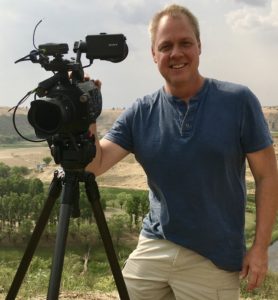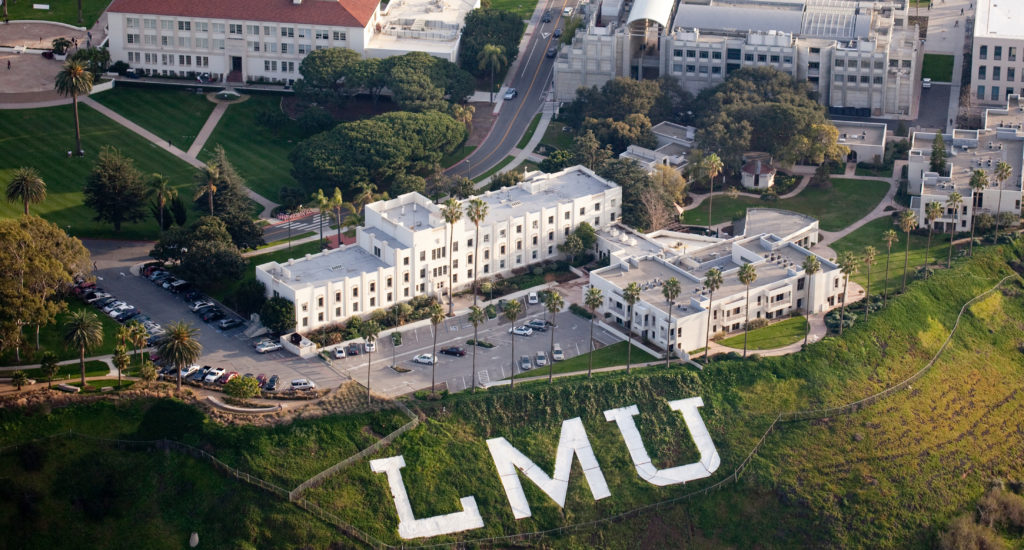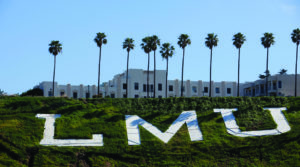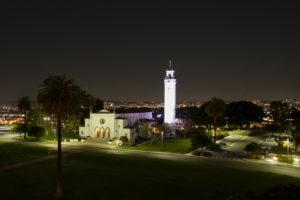
MISSION AND MINISTRY | Each year, typically on July 31, the LMU Community gathers together to celebrate the feast of our founder, St. Ignatius of Loyola. For Jesuits, the feast of St. Ignatius is also an occasion to begin their new assignments in various ministries and apostolates. This year’s feast was an occasion for LMU to welcome Eddie Siebert, S.J. who takes on the new role of rector of the LMU Jesuit Community, replacing Allan Deck, S.J. who served in this role for more than six years.
Father Eddie joined us at our weekly celebration of the Liturgy of the Word on Sunday, Aug. 2 to celebrate the Feast of St. Ignatius with the LMU community – in our virtual, sacred space on Zoom, and he delivered a wonderful scripture reflection that Campus Ministry would like to share with you.
The LMU Jesuits and the wider LMU Community welcome Father Eddie as he begins his six-year term as rector. Father Eddie’s scripture reflection, which he delivered at LMU’s celebration of the Feast of St. Ignatius, is shared here in both video and written formats. Our LMU family is grateful for Father Eddie’s inspiring words and for his invitation to follow the example of St. Ignatius as we grapple with the effects of the coronavirus pandemic. As Father Eddie rightly says, St. Ignatius would understand the world in which we are living, and he would understand this pandemic. May we follow the example of St. Ignatius that he witnessed at La Storta and find ourselves willing to take a leap of faith and creatively respond to this moment in our history while remaining true to our mission at LMU.
Photo: Communion of Saints
Used with Permission, Copyright 2003
John Nava/The Cathedral of Our Lady of the Angels
As we celebrate this Feast of St. Ignatius, we might ask ourselves, how would our founder want us to celebrate? Actually, from what we know, he probably wouldn’t want us to celebrate! At least not the way we like to celebrate at LMU.
However, I do think Ignatius would approve of reflecting on today’s gospel: What profit is there for one to gain the whole world yet lose or forfeit himself?
In Robert Bolt’s brilliant play and later Academy Award winning film, “A Man for All Seasons,” Sir Thomas More questions, Richard Rich about his motives, namely why the latter would sell out his soul for such an insignificant benefice. More says, “For Wales? Why Richard it profits a man nothing to give his soul for the whole world, but for Wales?”
We can laugh at Richard Rich, but how many of us sell their soul for one thing or another?
- manipulate the situation so we get our way,
- lie or cheat so we don’t look bad,
- push our agenda so we can stay in control,
- rush up to the front so we can be first…
I could go on and on, but this is a feast day.
Many of us may feel as if we’ve lost the world, at least the world that we knew and loved before the pandemic. I think I can confidently say that we are all tired of this new reality.
But when you think about who we are as members of this faith community, members of this LMU community, isn’t this precisely what we’ve given up our lives for? To instruct, to be available, to care, to lead, to build up just world, to be men and women for others, the Magis — don’t these things elicit the best in us?
When Ignatius and his early companions started out, the goal was to get to the Holy Land. This image of the first companions in Venice trying to get across the sea has become a bit of a cliché – it’s even made the documents of the past two General Congregations. If you’ve been to Venice, you can see how easy it is to romanticize about this scene. There is Ignatius and the first companions looking out into the sea, longing to get to Jerusalem. But they couldn’t. Too many obstacles. Too many setbacks.
Their reality in Venice was not that far removed from our reality today. When we think about their circumstances – they couldn’t do what they wanted to do. Rather than their choosing their first mission, God gave them one. Likewise, God has given us a mission.
Truth of the matter, we are not completely certain what that is. Nor do we know where it’s going to lead us.
So today, we need to make a leap of faith. I suggest we go back in time to 1537 to a small town just 7.5 miles from the center of Rome called LaStorta.
As Jesuit Michael Holman writes:
“It was here in this chapel that something happened to Ignatius, an experience that made a branding-iron impression upon him. If you want to know what it was that shaped and drove him and gave him and his first Jesuit companions their identity; if you want to know what still gives Jesuits and those others who follow the Ignatian way their identity today, then look to what happened in that chapel, one afternoon in the autumn of 1537.”
Ignatius had been praying intensely for the grace to be “placed with the Son.” And Ignatius didn’t do anything half-heartedly. He had a sense that God wanted to give him something. So, he put everything he had into his prayer. It was go big, or go home! And it happened. Ignatius had his vision of being placed with the Son. As Pedro Ribadeneira, a companion of Ignatius writes:
“There amidst the greatest fervor of his prayers, he felt his heart changed, and God the Father appeared to him, together with his most Blessed Son, who carried the Cross upon his shoulders and with the eyes of his soul, illustrated with that resplendent light, he saw that the Eternal Father, turning to his only begotten Son, commended Ignatius, and those in his company unto him, with exceed- ing great love, putting them into his hands. And our most benign Jesus having received them under his patronage and protection, as he stood in that manner, with his Cross, turned to Ignatius and with a loving and mild countenance said unto him: ‘Ego vobis Romae propitious ero’ (‘I will be favorable to you at Rome’).”[1]
Do we believe that God is going to be as propitious to us as God was to Ignatius and the first companions?
I don’t know that any of you have been having visions. At least none of you have cared to share them with me. But the era of uncertainty that was the seedbed of the first companions is the grace we’ve been given now. It’s not always a comfortable grace.
Our world is turned upside and our Jesuit education prepares us for this. We have been given the ability to thrive and create in an upside-down world.
When I think of so many families stuck at home… some of them not knowing if they are going to eat six months from now, children who need to be taken care of… Many of us don’t have those worries.
Look, as uncomfortable as this pandemic is, we should embrace this as a time of grace. And the most important thing is that our Jesuit values can shine at a time like this.
What drew people to the first companions was their courage. Their joy. They were bold. They uncovered something new; they embraced a challenging, changing world with confidence, strength, conviction and hope.
I consider myself a realist and I wonder if Ignatius would recognize some of the day-in and day-out aspects of our life. I wonder if Ignatius would understand:
- Making sure the department chair has your syllabus
- Posting your homework to Brightspace
- Getting your advisor to sign off on a course change
- Navigating the Concur system
- Committee meetings
- Parking registration
- The mandatory cyber-security tutorial
You get the idea!
I doubt that Ignatius would recognize much of his initial vision in many of our day-in-day-out concerns.
But the pandemic? This he would understand completely:
- He would understand the forces greater than human control that cut away at the fabric of society and erode our sense of confidence and security.
- Ignatius would understand our current social unrest and the cry for racial justice and equality and a fairer treatment of people.
- Ignatius would understand what’s happening on the streets of Portland, or Minneapolis or so many other cities.
- Ignatius would understand the political polarities that are tearing us apart as a nation and as a global community.
This gospel is timely. The fundamental is that we have to deny ourselves, take up our cross and follow Christ.
In the past, we may have chosen what we deny ourselves. But today, choices have been made for us. Who here has not had to let go of something that was so cherished?
During my Jesuit formation when it was time to go to regency, my heart was set on going to Detroit Jesuit High School. For all sorts of reasons, that didn’t work out, and I had to let that go.
I’ve had these powerful, relevant and entertaining television shows that I’ve been developing for months at Loyola Productions. I couldn’t get traction on them, so I had to let them go.
I’ve lived and worked with Jesuits whom I’ve come to love and admire, but some of them leave the Society of Jesus for another life. I had to say good-bye.
Marie Kondo, also known as Konmari, is a Japanese organizing consultant, author, and TV show host. She has sold millions of books around the world. Her underlying philosophy is simple. What brings you joy?
She writes:
“Keep only those things that speak to your heart. Then take the plunge and discard all the rest. By doing this, you can reset your life and embark on a new lifestyle.” “The best way to choose what to keep and what to throw away is to take each item in one’s hand and ask: “Does this spark joy?” If it does, keep it.”
And, there’s joy in letting go.
The point is, we all have things that we have to let go of. And move on. When Ignatius had that vision at LaStorta, everything changed. His prayer to be placed with the Son, paid off. He had a new surge of energy and confidence. He was free. He knew that God was going to be favorable to him no matter what happened.
As we see our lives somewhat reset during this pandemic and continue to experience our rapidly changing environment, we need to take stock of what we’ve lost and what we still have.
What profit we, if we give our soul for the whole world? Not much.
What profit we, if we lose our old world for what is yet to come? Everything!
On this Ignatius Day we recognize just how important our Jesuit education is.
What distinguishes us is precisely what the rest of the world fears.
The unknown is for us a window onto something new.
Things turning upside down shakes us free of stale habits and a scripted life.
The cries for help, especially those yearning for meaning draw us to something deeper and more profound.
Ignatius Day arrived “on time” this year.
Eddie Siebert, SJ
August 02, 2020 /LMU’s Virtual Celebration of the Liturgy of the Word
[1] Pedro Ribadeneira, Vita Ignatii Loyolae, chapter 9. This English translation comes from Ribadeneira Pedro de, The Life of B. Father Ignatius of Loyola, 1616 (York: 1976) 94–98. The Latin and Spanish versions have been published in Monumenta Historica




